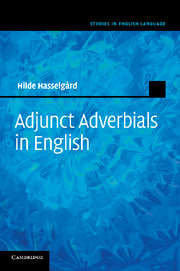Book contents
- Frontmatter
- Contents
- List of Figures
- List of Abbreviations
- Preface
- Part I A framework for analysing adverbials
- Part II Adverbial positions: theme, cohesion and information dynamics
- Part III Semantic types of adverbials: subtypes, frequencies and usage
- 9 Space and time adjuncts
- 10 Adjuncts of manner and contingency
- 11 Other adjunct types: participant, respect, focus, degree, situation, comparison and viewpoint
- Part IV Adjunct adverbials in English
- Appendix
- References
- Index
11 - Other adjunct types: participant, respect, focus, degree, situation, comparison and viewpoint
Published online by Cambridge University Press: 03 May 2010
- Frontmatter
- Contents
- List of Figures
- List of Abbreviations
- Preface
- Part I A framework for analysing adverbials
- Part II Adverbial positions: theme, cohesion and information dynamics
- Part III Semantic types of adverbials: subtypes, frequencies and usage
- 9 Space and time adjuncts
- 10 Adjuncts of manner and contingency
- 11 Other adjunct types: participant, respect, focus, degree, situation, comparison and viewpoint
- Part IV Adjunct adverbials in English
- Appendix
- References
- Index
Summary
Introduction
The present chapter deals with the less frequent adjunct categories: participant, respect, focus, degree, situation, comparison and viewpoint. Participant and respect adjuncts are presented relatively fully as regards their subtypes and their distribution across text types. The presentation of the remaining adjunct types is somewhat different. With the exception of degree adjuncts, they are not divided into subcategories and they are too infrequent in the core corpus for a study of their distribution to be meaningful. The discussion of these types thus focuses on frequency and co-occurrence with process types. In addition, focus, degree and viewpoint adjuncts are discussed with respect to placement, scope and adjunct status. There is a separate section on the placement and scope of focus and intensifier adjuncts.
Participant adjuncts
The category and the subtypes of participant adjuncts
Participant adjuncts are not a commonly recognised category of adjuncts; see sections 2.3 and 2.4.7. As the label suggests, they are a hybrid between adjunct function at the syntactic level and participant function at the semantic level. Quirk et al. (1985: 559) and Biber et al. (1999: 778) view agent adjuncts as a subtype of process adjunct together with manner, means, instrument and comparison. However, Biber et al.'s category of recipient adjuncts (1999: 781) roughly corresponds to that of beneficiary in the present classification.
Huddleston and Pullum (2002: 674) describe an expressed agent as an internalised complement rather than an adjunct (see also section 2.4.7).
- Type
- Chapter
- Information
- Adjunct Adverbials in English , pp. 240 - 256Publisher: Cambridge University PressPrint publication year: 2010



